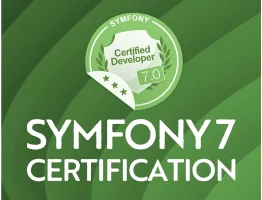Conventions
The Coding Standards document describes the coding standards for the Symfony projects and the internal and third-party bundles. This document describes coding standards and conventions used in the core framework to make it more consistent and predictable. You are encouraged to follow them in your own code, but you don't need to.
Naming a Method
When an object has a "main" many relation with related "things" (objects, parameters, ...), the method names are normalized:
get()set()has()all()replace()remove()clear()isEmpty()add()register()count()keys()
The usage of these methods is only allowed when it is clear that there is a main relation:
- a
CookieJarhas manyCookieobjects; - a Service
Containerhas many services and many parameters (as services is the main relation, the naming convention is used for this relation); - a Console
Inputhas many arguments and many options. There is no "main" relation, and so the naming convention does not apply.
For many relations where the convention does not apply, the following methods
must be used instead (where XXX is the name of the related thing):
| Main Relation | Other Relations |
|---|---|
get() |
getXXX() |
set() |
setXXX() |
| n/a | replaceXXX() |
has() |
hasXXX() |
all() |
getXXXs() |
replace() |
setXXXs() |
remove() |
removeXXX() |
clear() |
clearXXX() |
isEmpty() |
isEmptyXXX() |
add() |
addXXX() |
register() |
registerXXX() |
count() |
countXXX() |
keys() |
n/a |
Note
While setXXX() and replaceXXX() are very similar, there is one notable
difference: setXXX() may replace, or add new elements to the relation.
replaceXXX(), on the other hand, cannot add new elements. If an unrecognized
key is passed to replaceXXX() it must throw an exception.
Writing a CHANGELOG Entry
When adding a new feature in a minor version or deprecating an existing behavior, an entry to the relevant CHANGELOG(s) should be added.
New features and deprecations must be described in a file named
CHANGELOG.md that should be at the root directory of the modified
Component, Bridge or Bundle.
The file must be written with the Markdown syntax and follow the following conventions:
- The main title is always
CHANGELOG; - Each entry must be added to a minor version section (like
5.3) as a list element; - No third level sections are allowed;
- Messages should follow the commit message conventions: should be short, capitalize the line, do not end with a period, use an imperative verb to start the line;
- New entries must be added on top of the list.
Here is a complete example for reference:
1 2 3 4 5 6 7
CHANGELOG
=========
5.3
---
* Add `MagicConfig` that allows configuring thingsNote
The main CHANGELOG-* files at the symfony/symfony root directory
are automatically generated when releases are prepared and should never be
modified manually.
Deprecating Code
From time to time, some classes and/or methods are deprecated in the framework; that happens when a feature implementation cannot be changed because of backward compatibility issues, but we still want to propose a "better" alternative. In that case, the old implementation can be deprecated.
Deprecations must only be introduced on the next minor version of the impacted component (or bundle, or bridge, or contract). They can exceptionally be introduced on previous supported versions if they are critical.
A new class (or interface, or trait) cannot be introduced as deprecated, or contain deprecated methods.
A new method cannot be introduced as deprecated.
A feature is marked as deprecated by adding a @deprecated PHPDoc to
relevant classes, methods, properties, ...:
1 2 3
/**
* @deprecated since Symfony 5.1.
*/The deprecation message must indicate the version in which the feature was deprecated, and whenever possible, how it was replaced:
1 2 3
/**
* @deprecated since Symfony 5.1, use Replacement instead.
*/When the replacement is in another namespace than the deprecated class, its FQCN must be used:
1 2 3
/**
* @deprecated since Symfony 5.1, use A\B\Replacement instead.
*/A deprecation must also be triggered to help people with the migration
(requires the symfony/deprecation-contracts package):
1
trigger_deprecation('symfony/package-name', '5.1', 'The "%s" class is deprecated, use "%s" instead.', Deprecated::class, Replacement::class);When deprecating a whole class the trigger_deprecation() call should be placed
after the use declarations, like in this example from ServiceRouterLoader:
1 2 3 4 5 6 7 8 9 10
namespace Symfony\Component\Routing\Loader\DependencyInjection;
use Symfony\Component\Routing\Loader\ContainerLoader;
trigger_deprecation('symfony/routing', '4.4', 'The "%s" class is deprecated, use "%s" instead.', ServiceRouterLoader::class, ContainerLoader::class);
/**
* @deprecated since Symfony 4.4, use Symfony\Component\Routing\Loader\ContainerLoader instead.
*/
class ServiceRouterLoader extends ObjectRouteLoaderThe deprecation must be added to the CHANGELOG.md file of the impacted component:
1 2 3 4
4.4
---
* Deprecate the `Deprecated` class, use `Replacement` insteadIt must also be added to the UPGRADE.md file of the targeted minor version
(UPGRADE-4.4.md in our example):
1 2 3 4
DependencyInjection
-------------------
* Deprecate the `Deprecated` class, use `Replacement` insteadFinally, its consequences must be added to the UPGRADE.md file of the next major version
(UPGRADE-5.0.md in our example):
1 2 3 4
DependencyInjection
-------------------
* Remove the `Deprecated` class, use `Replacement` insteadAll these tasks are mandatory and must be done in the same pull request.
Removing Deprecated Code
Removing deprecated code can only be done once every two years, on the next
major version of the impacted component (6.0 branch, 7.0 branch, etc.).
When removing deprecated code, the consequences of the deprecation must be added
to the CHANGELOG.md file of the impacted component:
1 2 3 4
5.0
---
* Remove the `Deprecated` class, use `Replacement` insteadThis task is mandatory and must be done in the same pull request.
Naming Commands and Options
Commands and their options should be named and described using the English imperative mood (i.e. 'run' instead of 'runs', 'list' instead of 'lists'). Using the imperative mood is concise and consistent with similar command-line interfaces (such as Unix man pages).

